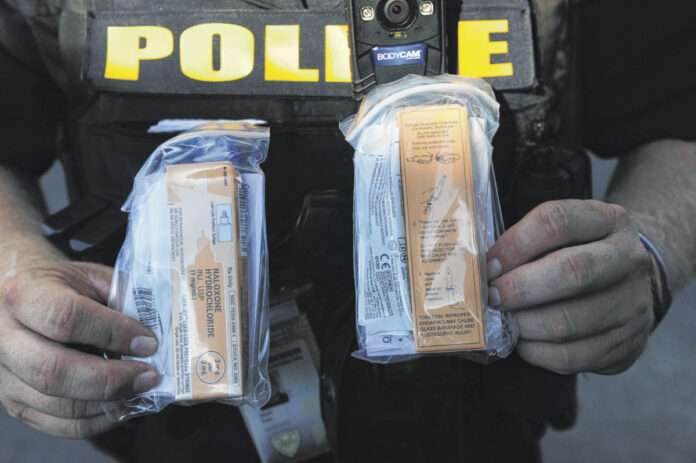
HANCOCK COUNTY — Researchers from Indiana University are recruiting a citizen response corps that will be trained to invervene in opioid overdoses using the antidote Naloxone.
The initiative, called the Opioid Rapid Response System, will employ an emergency response app, called PulsePoint, which already is being used in Hancock County to aid volunteer response to people suffering cardiac arrest. Citizen responders will be able to intervene in overdoses in much the same way, administering treatment quickly, often before first-responders arrive.
The effort is part of a study by the Prevention Insights program at Indiana University’s School of Public Health in Bloomington. It is being funded thanks in part to a $213,000 grant from the National Institute on Drug Abuse of the National Institutes of Health. Hancock County was chosen in part because it is one of the counties that uses the PulsePoint services. Boone County also is part of the effort.
An assistant research scientist at IU, Dr. Wasantha Jayawardene, said involving citizen responders makes sense. “If current circumstances prevail, over 80,000 people will die due to opioid overdoses in 2025,” Jayawardene said in a news release. “Community-engaged, novel interventions are urgently required in order to change the course of this devastating epidemic.”
Cris Henderson, evaluation specialist and research associate at Prevention Insights, said the program will build on a pilot program in Clark County. Using the PulsePoint app, which connects citizen responders to opioid overdose events reported through 911, more than 1,300 individuals were cross-trained in naloxone and CPR administration from January 2019 to July 2019 in Clark County. That resulted in 483 private CPR events with citizen responders with five naloxone resuscitations by citizen responders.
As of 2020, more than 3,000 PulsePoint users in Clark County are part of the response network.
Researchers are hoping to get the same kind of positive results in Hancock County.
“Too often, emergency responders in rural counties cannot get to an overdose event quickly enough,” Henderson said in the news release. “We are working at the local level to cultivate greater support for cross-training citizen responders to administer naloxone, which is safe and increases the chances of saving lives in communities with higher rates of fatal and non-fatal opioid overdoses.”
The research program coincides with a statewide initiative from the administration of Gov. Eric Holcomb. The Indiana Family and Social Services Administration’s Division of Mental Health and Addiction is working with Overdose Lifeline Inc. to expand access to naloxone through the purchase of “NaloxBox” units that will be placed in communities and will provide 24/7 access to the overdose-reversing medication.
“Making overdose response tools like naloxone readily available to any Hoosier who may encounter an individual suffering from an overdose is critical in addressing the drug epidemic,” Holcomb said in a news release.
Henderson noted the governor’s program is wonderful and will coalesce with the IU effort train citizen responders.
“Thanks to the governor’s program, there’s likely to be a NaloxBox in more public places like grocery stores, gas stations, etc…” Henderson said in an email to the Daily Reporter.
A shortcoming with the governor’s program is it doesn’t address training, which their team is doing, Henderson said.
Any business or community entity interested in helping Hoosiers at risk of opioid overdose is eligible to request a NaloxBox to install in an accessible and highly visible area. Community partners who receive a unit will be responsible for monitoring the NaloxBox daily and requesting naloxone refills after use.
Overdose Lifeline Inc. spent $58,200 for 215 NaloxBox units. Funds were made available by the federal Substance Abuse and Mental Health Services Administration’s state opioid response grant.
Capt. Chuck McMichael, public information officer with the Greenfield Police Department, said GPD offered the department’s lobby as a place to put one of the boxes, but the vendor shared GPD’s concern about installing one at a law enforcement agency.
“Our concern, theirs as well, is that people will be afraid to come into our building to get the Naloxone when they need it in fear of retribution or arrest,” McMichael said. “This in turn defeats the purpose of the program altogether.”
McMichael said they want the public to have access to the life-saving drug and don’t want people to be afraid of getting it.
All patrol officers carry Naloxone when they are working, so it already is available to them at any time.
“We have done this for many years now and saved countless lives since we began carrying it,” McMichael said.
So far in 2021, GPD officers have used seven doses on five people. The need is real and substantial, he said.
“If more people have access to Naloxone, more families of people struggling with substance abuse disorders will be able to sleep at night knowing that help is close,” McMichael said.
Officials with GPD are on board with the IU training program and encourage people to subscribe to the PulsePoint app, especially if they have training in first-aid and CPR.
“In any medical emergency, time is precious and lives can be saved,” McMichael said. “I think it’s great that this tool is being developed for such instances.
In the meantime, McMichael is working on finding a more suitable place in town willing to house a NaloxBox.
HOW YOU CAN HELP
Anyone interested in being part of the IU citizen responder training program — which will be conducted online — should visit, https://prevention.iu.edu/projects/orrs/ for more information.
Businesses or community entities who wish to receive a NaloxBox should contact Justin Phillips, founder and executive director of Overdose Lifeline Inc. at [email protected].
First-responders, families, caregivers, and other individuals who would like to receive a supply of naloxone can register online at www.overdoselifeline.org/2020-indiana-naloxone-request.




